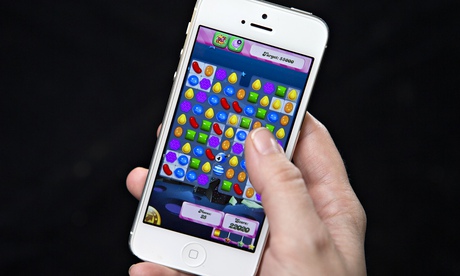
Britain's highest valued games company has hit severe turbulence after reporting lower-than-expected second-quarter revenue and profits.
Shares in King Digital lost close to a quarter of their value on Tuesday after the video games maker reported declining popularity for its phenomenally successful Candy Crush Saga.
Reporting after stock markets closed, the Anglo-Swedish company said gross bookings for the quarter – a measure of how much users pay for virtual items in its games – fell to $611.1m (£363.5m) from $641m in the previous quarter.
The 5% fall came largely from a drop in revenues from Candy Crush, the hit that accounts for about 60% of its gross revenues. Last year the company reported 97 million people were playing Candy Crush every day.
On a conference call with investors, King chief executive officer Riccardo Zacconi said the fall was due to a "step down in monetisation across our network" including its other hits Farm Heroes Saga and Bubble Witch.
Candy Crush's bookings peaked in the third quarter of 2013 and the rate of decline picked up at the end of the last quarter, he said. He added that the company expected the slowdown to continue.
Investors sold the stock in after-hours trading and King's shares initially slumped close to 24%. King's stock has had a rocky ride since the company went public in March at $22.50 a share, valuing the firm at $6bn. Before the latest results they were trading at $18.20.
The company reported nearly $1.9bn in revenue in 2013, compared with just $164m in 2012, driven almost entirely by the players buying virtual goods in Candy Crush.
Zacconi said the company had "a strong and expanding portfolio of games", and had "demonstrated our ability to produce high quality games". The company cut its 2014 outlook and declared a $150m special dividend.
The most highly valued British company to emerge from the new technology boom, King was valued at $7bn when it began trading on the New York stock exchange in March but ran in to trouble from the start, dropping by 16%.
Traders on the open market tore into King's valuation minutes after Zacconi and fellow directors rang the opening bell. Shares which had originally been priced at $22.50 ended the day at $19, and continued to dip in after-hours trading.
Analysts had compared the 11-year-old company to US games developer Zynga, maker of FarmVille and Words With Friends, whose shares are currently worth less than a third of their 2011 float price of $10.
Candy Crush has dominated the smartphone games charts since launching on mobile in November 2012, and helped raise revenues to $1.9bn last year for King, whose other games include Pet Rescue Saga and Papa Pear Saga.
But the confectionery-themed game, in which players must make lines of sweets disappear from a grid by lining up three or more of the same colour, is no longer a top 10 download, despite still being the second-highest grossing game on iPhone in the US.
Zacconi and chairman Melvyn Morris, a former director of Derby FC, first worked together at the Midlands-based matchmaking site uDate, which they sold for $150m to Interactive Corporation in 2002.
Zacconi entered the digital business during the dotcom boom and ran the German unit of Swedish web portal Spray, which failed to make it to the stock market before the bubble burst. He launched King with colleagues from Spray, and persuaded some of uDate's backers, including Morris and Toby Rowland, to join the venture.
King has been planning to open a second London studio this summer, taking over the Covent Garden office currently occupied by Facebook. The new studio is based in a brick warehouse at 42 Earlham Street in Covent Garden, home to Facebook's British staff and its European boss Nicola Mendelsohn since 2012.

